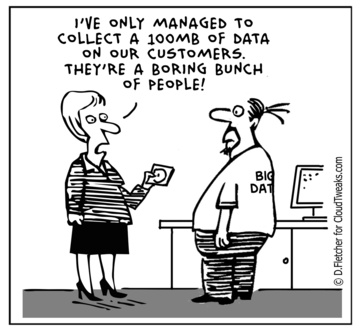- 91% of marketing leaders believe successful brands use customer data to drive business decisions (source: BRITE/NYAMA)
- 90% of the world’s total data has been created just within the past two years (source: IBM)
- 87% agree capturing and sharing the right data is important to effectively measuring ROI in their own company (BRITE/NYAMA)
These facts say loud and clear companies believe data helps them make better business decisions.
Big Data is a broad term for data that comes from places like web browsers, social networks, census, surveillance and sensors. It’s stored in computer clouds, and searched for patterns, predictive analytics and insights.
According to IDS, in the next 12-18 months, organizations plan to invest in skill sets necessary for big data deployments, including data scientists (27%), data architects (24%), data analysts (24%), data visualizers (23%), research analysts (21%), and business analysts (21%).
But is bigger better?
Here are 10 data experts who explain why little data is the new big data.
- “Big data has been hyped so heavily that companies are expecting it to deliver more value than it actually can. The exception. Companies that have a culture of evidence-based decision making, tend to be more profitable than companies that don’t have that kind of culture.” – Jeanne W. Ross, Cynthia M. Beath and Anne Quaadgras, Harvard Business Review
- “What we track determines where we focus and what we are motivated to improve. Why do people obsess over LinkedIn Connections or Twitter followers? SAT scores, golf handicaps, or even gas mileage? Because they are observable metrics that are easy to compare. Before you obsess over a particular metric, make sure it’s the right metric to obsess over.” – Johan Berger
- “How to beat the big data giant? Start by thinking little data, as in David vs. Goliath. The first step in the little data process is to identify key business objectives that your organization would like to have data solve. Make big decisions and eliminate the need to capture and manage the irrelevant data within the 2.4 quintillion bits of digital data generated each day from the big data stream.” – Gary Drenik, Forbes
- “Size in itself doesn’t matter – what matters is having the data, of whatever size, that helps us solve a problem or address the question we have. For many problems and questions, small data in itself is enough. The data on household energy use, the times of local buses, government spending – these are all small data.” – Rufus Pollock, Open Knowledge Foundation
- “Corporate decision-makers often would be better served if they rely on tried-and-true tools and systems from the world of Little Data, rather than illusions from Big Data. Sampling theory teaches that if the sample is random, one can measure the behavior or mood of the whole by talking to very few people. A sample of 1,500 is sufficient to predict who will win a presidential election. A sample of 200-300 respondents is generally sufficient to predict how much the whole population will like a new product or service.” – Jerry W. Thomas, Decision Analyst
- “Big Data is what organizations know about people — be they customers, citizens, employees, or voters. Data is aggregated from a large number of sources. Little Data is what we know about ourselves. What we buy. Who we know. Where we go. How we spend our time. Without Little Data, Big Data has a tendency to become Big Brother. We’ve all experienced that unsettling feeling when ads follow us on the web.” – Mark Bronchek, Harvard Business Review
- “Log daily. Reflect quarterly. Plan yearly. This simple model can provide the data and structure you need to take control. Your yearly reflection will provide you the insight needed to make clear, data-driven decisions.” – John Caddell, author The Mistake Bank
- “Big data’s little brother is ‘small data’ or traditional KPIs (Key Performance Indicators) that help to measure success in companies. Any data, and in particular ‘big data’, only becomes meaningful and relevant in the context of the business success, measured by KPIs.” – Bernard Marr, Advanced Performance Institute
- “Little data constitutes the nuts and bolts metrics of running a business. For a Web property, that means getting a handle on issues such as the bounce rate, SEO session starts, social session starts, funnels of how users flow through a property, and page views per session. Too many people lose sight of these simple but critical metrics.” – Peter Varad, Cnet
- “So if you’re wondering whether to use big or little data, fuhgetaboutit. Instead you should be wondering whether your company is good at using data period. If it isn’t, then that’s the battle you should fight.” – Pam Baker, Fierce Big Data
Is your company good with data? Let us help your company get there. Or consider taking a Digital Marketing or Social Media Mini-MBA at the Rutgers Business School Executive Education where I teach Web Analytics and ROI for Better Decision Making.
Do you think little data is the new big data? Which is going to help you company make better decisions?





